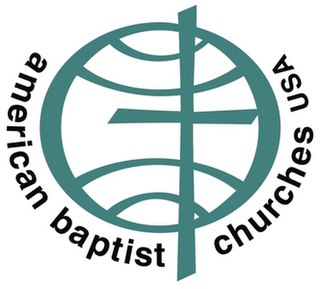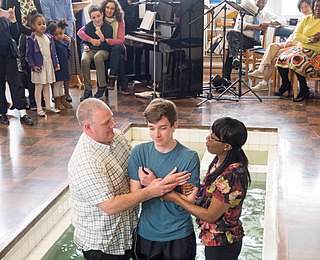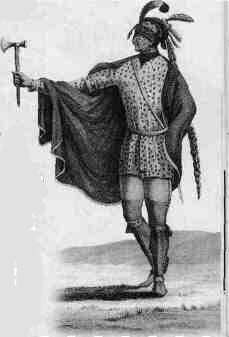
Centralia is a city in Clinton, Jefferson, Marion, and Washington counties in the U.S. state of Illinois with the largest portion in Marion County. The city is the largest in three of the counties; Clinton, Marion, and Washington, but is not a county seat of any of them. The population was 12,182 as of the 2020 census, down from 13,032 in 2010.

The Southern Baptist Convention (SBC) is a Christian denomination based in the United States. It is the world's largest Baptist denomination, and the largest Protestant and second-largest Christian denomination in the United States. The word Southern in "Southern Baptist Convention" stems from its having been organized in 1845 in Augusta, Georgia, by white supremacist Baptists in the Southern United States who were supportive of enslaving Americans of African descent and split from the northern Baptists.

The American Baptist Churches USA (ABCUSA) is a mainline/evangelical Baptist Christian denomination within the United States. The denomination maintains headquarters in Valley Forge, Pennsylvania. The organization is usually considered mainline, although varying theological and mission emphases may be found among its congregations, including modernist, charismatic and evangelical orientations. It traces its history to the First Baptist Church in America (1638) and the Baptist congregational associations which organized the Triennial Convention in 1814. From 1907 to 1950, it was known as the Northern Baptist Convention, and from 1950 to 1972 as the American Baptist Convention.

The American Baptist Association (ABA) is an Independent Baptist Christian denomination in United States. The headquarters is in Texarkana, Texas. The principal founder was Ben M. Bogard, a pastor of Antioch Missionary Baptist Church in Little Rock, Arkansas. ABA headquarters, including its bookstore and publishing house, Bogard Press, is based in Texarkana, Texas.

Two-Seed-in-the-Spirit Predestinarian Baptists are part of a larger sub-group of Baptists that is commonly referred to as "anti-mission" Baptists. This sub-group includes the Duck River and Kindred Baptists, Old Regular Baptists, some Regular Baptists and some United Baptists. Only a minuscule minority of Primitive Baptists adhere to the Two-Seed doctrine. The primary centers of Two-Seedism were in Northern Alabama, Arkansas, Eastern Tennessee, Florida, Georgia, Illinois, Indiana, and Texas. As of 2002, five churches or congregations of this faith and order still existed in Alabama, Indiana, Tennessee, and Texas.
Primitive Baptists – also known as Hard Shell Baptists, Foot Washing Baptists or Old School Baptists – are conservative Baptists adhering to a degree of Calvinist beliefs who coalesced out of the controversy among Baptists in the early 19th century over the appropriateness of mission boards, tract societies, and temperance societies. The adjective "primitive" in the name is used in the sense of "original".

Though the annual meeting of this group is denominated The General Association of The Baptists, they are most widely known as the Kindred Associations of Baptists. Other names associated with these churches are the Baptist Church of Christ, The Baptists, and Separate Baptists. The primary location of the churches is middle Tennessee and northern Alabama. Members from this association form the largest body of Baptists in Moore County, Tennessee.

The Baptist General Convention of Texas (BGCT) is the oldest surviving Baptist convention in the state of Texas. It is affiliated with the Southern Baptist Convention and the Baptist World Alliance. In 2009, the BGCT began to also go by the name Texas Baptists to better communicate who they are. The convention's offices are located in Dallas, Texas, though convention staff are located across the state. The president of the BGCT is Jason Burden and the Executive Director is David Hardage.

The National Missionary Baptist Convention of America (NMBCA) is an African-American Baptist convention.
The Church of Christ, Instrumental, also known as Kelleyites, are a baptistic body of Christians based in central Arkansas.

The Kaskaskia were one of the indigenous peoples of the Northeastern Woodlands. They were one of about a dozen cognate tribes that made up the Illiniwek Confederation, also called the Illinois Confederation. Their longstanding homeland was in the Great Lakes region. Their first contact with Europeans reportedly occurred near present-day Green Bay, Wisconsin, in 1667 at a Jesuit mission station.
John Taylor (1752–1833) was a pioneer Baptist preacher, religious writer, frontier historian and planter in north and central Kentucky. His two histories of early Baptist churches in Kentucky provide insight into the frontier society of the early decades of the 19th century. His 1820 pamphlet entitled "Thoughts on Missions" put him at the center of the controversy within frontier Baptist congregations about supporting mission societies. In buying and selling land on the frontier, Taylor acquired 2,000 acres (8.1 km2) and 20 African-American slaves by the end of the first decade of the 19th century, thus entering the planter class.

The Diocese of Belleville is a Latin Church ecclesiastical territory or diocese of the Catholic Church in the southern Illinois region of the United States. It comprises the southern counties of the state of Illinois and the See city for the diocese is the City of Belleville. It is a suffragan see in the ecclesiastical province of the metropolitan Archdiocese of Chicago. The cathedral parish for the diocese is the Cathedral of Saint Peter. Following the resignation of Edward Braxton on April 3, 2020, Michael G. McGovern was installed as the current Bishop of Belleville.
Founded in 1840, the Kaskaskia Baptist Association is a Southern Baptist ministry centered in Patoka, Illinois and is active in ministry to people in Southern and South Central Illinois Named after the Kaskaskia River, it consists of thirty-three churches in Southern and South Central Illinois, and in recent years has become involved with the Southern Illinois Hispanic Outreach Project, a cooperative missions agency working with Hispanics throughout Southern Illinois. Bimonthly it publishes the Kaskaskia Baptist Visitor, a newsletter with a circulation of about 1,000 that reports on mission projects and church news from throughout the association.
Clear Creek Baptist Bible College (CCBBC) is a private Baptist Bible college in Pineville, Kentucky. It is affiliated with the Kentucky Baptist Convention. CCBBC provides a Bible-based education focusing on Christian service. The college is accredited by the Commission on Colleges of the Southern Association of Colleges and Schools and the Association for Biblical Higher Education. CCBBC was founded by Lloyd Caswell Kelly in 1926. Donnie Fox has been the President of Clear Creek Baptist Bible College since April 25, 2007.
The American Baptist Home Mission Society is a Christian missionary society. Its main predecessor the Home Mission Society was established in New York City in 1832 to operate in the American frontier, with the stated mission "to preach the Gospel, establish churches and give support and ministry to the unchurched and destitute." In the 19th century, the Society was related to the Triennial Convention of Baptists. Today it is part of that Convention's successor, the American Baptist Churches, USA, and is the successor by merger of several 19th century Baptist organizations related to missions and education, including publications (1824), women (1877), and education (1888).
The Vandalia Baptist Association (1840–1880) was renamed the Centralia Baptist Association when churches from Centralia, Mt. Vernon and other churches south of Centralia, Illinois joined the Association in 1881. It was renamed the Kaskaskia Baptist Association in 1912.
The Alabama Baptist Convention is an autonomous association of Baptist churches in the state of Alabama formed in 1823. It is one of the state conventions associated with the Southern Baptist Convention.

Emeline S. Burlingame was an American editor, evangelist and suffragist. She served for seven years as president of the Rhode Island Woman's Christian Temperance Union (W.C.T.U.), and was the first president of the Free Baptist Woman‘s Missionary Society (W.M.S.). She was a licensed preacher, and was three times a delegate to the free baptist triennial conference. Burlingame held positions with several religious publications, including, for eight years, editor of the Missionary Helper for many years. She was a potent factor in securing Rhode Island State constitutional prohibition for 1884–1887. Considered a suffrage luminary, she authored the leaflet, “An Appeal to Women’s Missionary Societies Urging Church Women to Support Woman Suffrage as a Step Toward More Efficient Missionary Work,” which was printed and distributed by the National American Woman Suffrage Association among missionary societies. Burlingame died in 1923.
The Kaskaskia were an indigenous North American tribe of the Northeastern Woodlands.